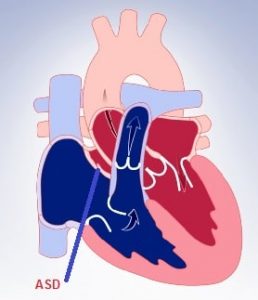Atrial Septal Defect, ASD
Atrial Septal Defect (ASD)
It is a congenital condition in which there is perforation between the upper chambers of your heart called atria which is separated by the septum called atrial septum. In many cases hole is so small that it does not diagnosis to the whole life or diagnosis accidently during chest ultrasound.
Symptoms
Initially it does not produce any sign and symptoms but later they cause:
- Fatigue or malaise
- Edema of lower extremities
- Abnormal heart sounds
- Stroke
- Palpitations
- Shortness of breath during exertion
Causes
Structurally heart is consisting of upper and lower chamber and each chamber divided into two chambers left and right chamber. Upper chambers know atria and lower chambers called ventricle. Right and left chamber divided by muscular septum which prevent the blood mixing in the chambers. Oxygenated blood comes from the lung in the left side of the heart from which heart supplies the whole body and deoxygenated from the whole body comes in right side of heart. Defects in septum in mainly congenital developed during the development of heart in utero. Genetics and environmental toxic may play the role in the development of the congenital heart defects.
Complications
If large hole in septum is left untreated then it may cause the following complications:
- Stroke
- Short life duration
- Arrhythmias
- Right sided heart failure
- Pulmonary hypertension
- Eisenmenger syndrome
Diagnosis
During childhood or infancy your doctor might assume the heart murmur during routine checkup and recommend the following test to confirm the diagnosis:
- Chest X-ray. To see the condition of heart and lungs
- To evaluate the pumping ability of your heart
- To check the electrical activity of the heart
- CT scan. This will provide the better image of the heart
Treatment
In many cases small hole may close on its own during childhood and does not cause any serious complications but large hole may require treatment which include:
- Drugs does not repair the defect in septum but it may reduce the signs and symptoms which is associated with atrial septal defect and reduce the risk of complications which include beta blocker to control the heart rhythm and blood thinning medication to prevent the clot formation.
- It may provide the complete cure to septal defect. Surgical option includes open heart surgery or by-pass surgery, cardiac catheterization etc.
- If its diagnosis during infancy and defect is small enough to produce any sign and symptom then it only required close monitoring.
Lifestyle and Home Remedies
- Prevent infection prior to surgery
- Mild exercise may help to strength the heart muscles.
- Eat healthy food
- Avoid fat rich diet
